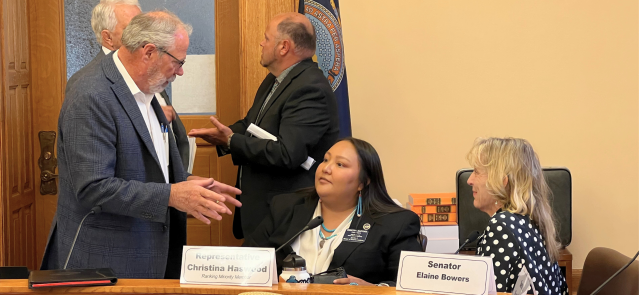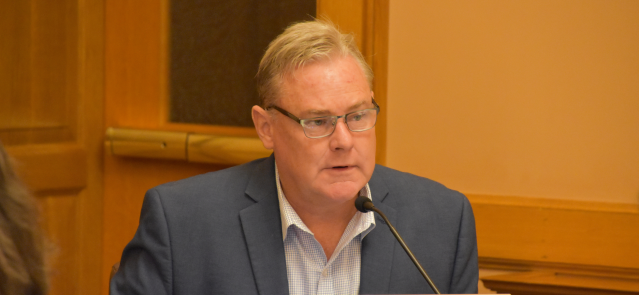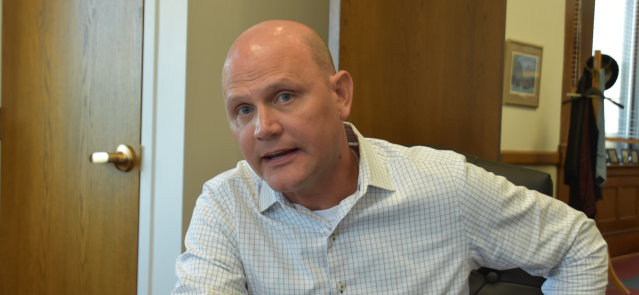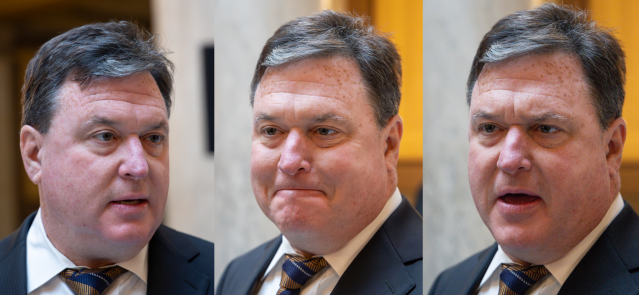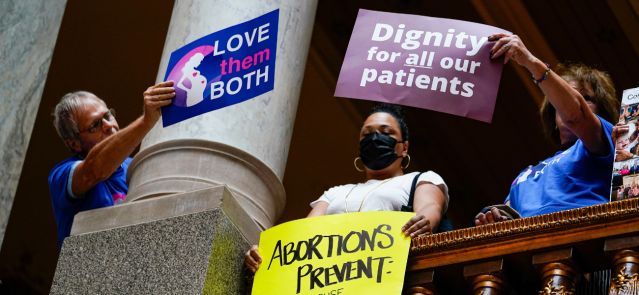Editor’s note: This story is the first in a two-part look into the race for Indiana attorney general in 2024. A story on Democratic challenger Destiny Wells will be published next week.
Todd Rokita walked onto the stage at the Indiana Republican Party convention wearing a pair of boxing gloves despite having no one to oppose him for the party’s nomination in the November election.
The gloves were, he would imply, for fighting back against Democrats. The gesture itself was analogous to Rokita’s first term as attorney general — one striped with conflict over what some see as his inflammatory language, be it with political opponents, the Indiana Supreme Court or the governor of his own party.
Rokita, now seeking a second term, is happy to engage with his perceived enemies.
“The vitriol and the hate from all of the socialists on the left — you would think makes things more difficult and less intriguing,” he said. “But it really just spurs me on to protect the people of this state and the state itself.”
Destiny Wells, the Democrat challenging Rokita in November, said his penchant for involving the state in national political issues — abortion, immigration and so on — has embarrassed Indiana and ruffled more than a few feathers in the Republican Party.
“We need to get out of the business of national culture issues,” she said.
Others, however, say Rokita is right where he should be.
“He’s done exactly what he said he would do,” Michael Schopmeyer, a partner at Kahn, Dees, Donovan & Kahn, LLP in Evansville, said of Rokita’s time in office. Schopmeyer has known Rokita since his 2002 election as secretary of state. He served on Rokita’s attorney general transition team in 2020.
Reprimanded by Supreme Court
Perhaps Rokita’s most well-known interactions since taking office unfolded in 2022 and 2023, when he took issue with an Indianapolis physician who provided an abortion to a 10-year-old rape victim from Ohio.
In a July 2022 Fox News interview, Rokita called the physician, Dr. Caitlin Bernard, an “abortion activist acting as a doctor” and accused her of not filing required medical reports. He then called on the state Medical Licensing Board to suspend Bernard’s license.
Bernard was ultimately reprimanded and fined, but not suspended, for speaking to an Indianapolis Star reporter about the case.
Wells, Rokita’s opponent, said the state needed to “get out of the doctor’s office.”
“Todd is abusing his authority in an attempt to chill care,” she said.
More than a year later, Rokita was reprimanded by the Indiana Supreme Court for the comments. The reprimand came as part of an agreement Rokita reached with the court’s Disciplinary Commission, an appointed board of seven attorneys and two non-attorneys that reviews complaints and enforces ethics requirements in the legal community.
“Everything I said about Caitlin Bernard was true,” Rokita told State Affairs about the incident. “The media narrative tried to make it out like I was being accused of and have been found to say some false things, and I didn’t.”
Rokita said he agreed only that his comments could be perceived as ill-timed. He did not acknowledge any wrongdoing.
“In order to save the state money and to show we can all do things better, I settled the matter,” said Rokita, who has since been accused of misconduct in several other grievances on unrelated matters.
The Disciplinary Commission is investigating at least one such grievance, which claimed Rokita took a position opposite of the Indiana Department of Health on whether terminated pregnancy reports are a matter of public record. As the attorney general’s office represents the Department of Health and other state agencies in court, the complaint supposes an ethics breach.
Rokita said the grievance process has been “weaponized and politicized” against him.
“The disciplinary commission is focused on my speech,” Rokita said. “I have a First Amendment right against my government to speak. This is not me grabbing anybody or stealing money. It’s about political speech.”
Justin Forkner, chief administrative officer of the Supreme Court’s Office of Judicial Administration, refuted Rokita’s claims.
“The Commission members are selected without regard to political party and represent Indiana’s population and legal practice,” he said in a statement. “Their work is not political and is limited to the procedures laid out in the Court’s Admission and Discipline Rules.”
Forkner said all attorneys are held to the same standard and given multiple opportunities to weigh in on the claims made against them.
Pandemic criticism
In March, Rokita released a report claiming Indiana had overreported deaths during the COVID-19 pandemic. In his interview with State Affairs, he defended the report, as well as both preceding and ensuing conflicts with Gov. Eric Holcomb.
Rokita said he does not judge Holcomb for issuing a stay-at-home order in 2020, several months prior to Rokita’s election. However, Rokita said he would not have handled it the same way and would “do everything in his power” to stop a shutdown should a similar situation arise.
“Real leadership comes from quickly diagnosing an issue and seeking an action,” Rokita said. “And, if it’s wrong, adjusting.”
Holcomb took issue with a statement Rokita made on a local newscast questioning the Indiana Department of Health’s COVID-19 numbers.
The governor has not reviewed Rokita’s report, the attorney general said. The report claimed Indiana overreported death totals by 10.9% in 2020, 7% in 2021 and 12.5% in 2022.
“The governor said, ‘We put no weight in the report.’ Well, that’s because of his inability to show any leadership,” Rokita said.
The Indiana Department of Health declined to comment on Rokita’s statements. A spokeswoman for Holcomb did not respond to a request for comment.
It was not the only COVID-related clash between the governor and attorney general.
Holcomb took issue with a 2021 bill that allowed the Indiana General Assembly to call itself into session after the governor declared an emergency — a responsibility that normally rested solely with the governor. Rokita sided with the Legislature and represented it in court despite also typically representing the governor’s office in legal matters.
The Indiana Supreme Court then unanimously ruled the legislation was unconstitutional.
‘Eyes on Education’
Rokita again waded into national political debate with his “Parents’ Bill of Rights,” a 108-page document released in four sections between June 2021 and August 2023. The first installment came at a time of national conservative outrage over COVID-19 restrictions in schools.
He said at the time he sought to fight the “indoctrination” of students and focus teachers on academics amid lagging test scores.
The Indiana Democratic Party criticized Rokita’s rollout at the time, saying he released the document “to double down on his crusade on culture war issues.”
Rokita told State Affairs he first offered the document to Indiana Secretary of Education Katie Jenner but received no response.
“Where there’s a vacuum of leadership, I will fill it,” Rokita said of his fellow Republican official.
A spokeswoman for Jenner did not respond to a request for comment.
In February, Rokita launched his “Eyes on Education” portal, which allowed citizens to report instances of political ideology in schools. Districts immediately criticized the information contained in the portal as outdated or inaccurate.
Rokita said his office received 30 or so lesson plans showing critical race theory — an academic field centered around the social implications of race and a popular villain for conservatives — being taught in Indiana schools. His office validated submissions to the portal, he added.
School administrators should use the portal to verify what is and isn’t being taught on their campuses, Rokita said.
Immigration fights
Rokita touted his office’s many legal battles with President Joe Biden’s administration, especially on immigration.
“We’re proud to be the first non-border state to sue Biden for lawlessness at the border,” he said.
Closer to home, Rokita has pushed for the removal of “sanctuary city” laws from Indiana municipal codes. Such laws generally involve a government pledging its employees will not fully cooperate with federal immigration officials and are banned by state law.
Three cities — West Lafayette, Gary and East Chicago — amended their local laws to Rokita’s satisfaction. The attorney general’s office has filed a lawsuit against Monroe County, which Rokita said has refused to repeal a sheriff’s department policy.
Rokita referred to the lawsuits against Biden and Monroe County as “part of my portfolio protecting Hoosiers from illegals.”
Indiana Democrats have criticized Rokita’s focus on national issues, which they say have no bearing on the state.
“Todd Rokita has been very extreme, very partisan in his approach to the job,” Indiana Democratic Party Chair Mike Schmuhl told State Affairs. “He’s really attracted to national politics and culture wars.”
Rokita on the job
Rokita enjoys his job, controversies and all.
“I’ve been secretary of state and a congressman,” he told State Affairs. “This work allows me to get more done than the other two offices combined.”
The attorney general’s primary duties are to represent the state and its agencies in civil court and criminal appeals, offer legal advisory opinions and return unclaimed property to Hoosiers.
To those ends, his office has secured more than $1 billion in settlements, racked up a 98% win rate on jury trials and returned more than $81 million in unclaimed property in 2023, Rokita said. He’s led legal action against unscrupulous landlords and companies that dump harmful chemicals in the state — two areas in which a Republican wouldn’t normally act, Rokita added.
‘He fits the state’
Rokita has protected election integrity, supported school vouchers and done well in fighting against abortion, Schopmeyer, the Evansville lawyer, said.
“He may have gone a little further than I would have gone on COVID,” Schopmeyer said. “We needed to shut down for a while, but it went too long.”
Schopmeyer also questioned the wisdom of the “Eyes on Education” portal.
“You have to trust teachers,” he said. “It’s problematic when the capital sticks its nose in education.”
But Rokita probably fits the electorate, Schopmeyer said.
“He’s probably a little more right than I’d want to be, but he fits the state,” Schopmeyer said of Rokita.
Contact Rory Appleton on X at @roryehappleton or email him at [email protected].
Correction: This story has been updated to correct the dollar amount of unclaimed property returned by the Attorney General’s Office.
Todd Rokita
- Title: Attorney General
- Age: 54
- Hometown: Brownsburg
- Education: Bachelor’s degree from Wabash College, law degree from Indiana University Indianapolis
- Career: Indiana Secretary of State (2002-10), 4th District congressman (2011-2019), Indiana Attorney General (2020-present). Rokita also ran unsuccessfully for the governor’s nomination in 2016 and U.S. Senate in 2018.
- Family: Rokita and his wife, Kathy, have two sons
- Hobbies: Piloting
